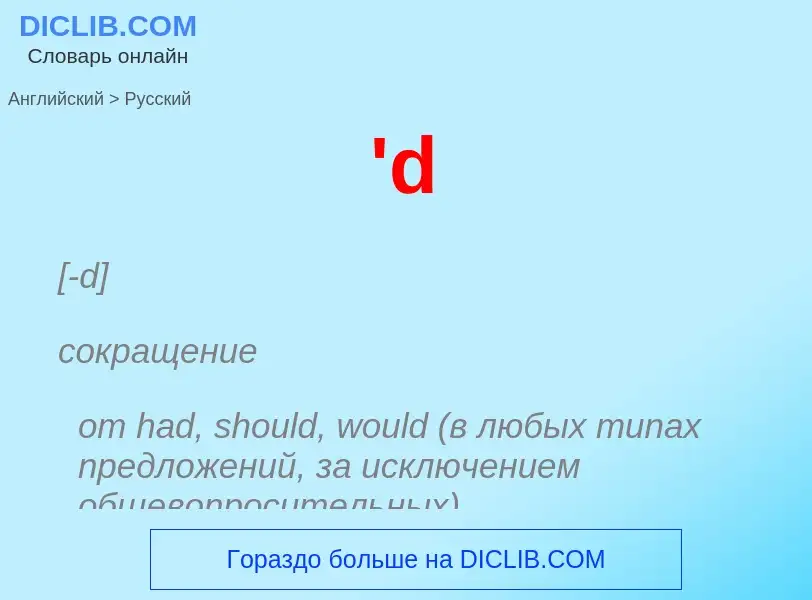Translation and analysis of words by ChatGPT artificial intelligence
On this page you can get a detailed analysis of a word or phrase, produced by the best artificial intelligence technology to date:
- how the word is used
- frequency of use
- it is used more often in oral or written speech
- word translation options
- usage examples (several phrases with translation)
- etymology
'd - translation to English
[-d]
сокращение
от had, should, would (в любых типах предложений, за исключением общевопросительных)
of had
[di:]
общая лексика
4-я буква английского алфавита
4-й номер серии
(D) пятьсот (римское обозначение этого числа)
в грам. знач. прил. (также как компонент сложных слов)
(D-) имеющий форму буквы D
D-образный
четвёртый по счёту
математика
d (обозначение знака дифференциала)
музыка
ре (D)
школьное выражение
переходный балл
низкий балл (D)
междометие
общая лексика
([сокр.] от damn)
существительное
общая лексика
дочь
демократ, член демократической партии
демократический, относящийся к демократической партии
синоним
Definition
Wikipedia
A contraction is a shortened version of the spoken and written forms of a word, syllable, or word group, created by omission of internal letters and sounds.
In linguistic analysis, contractions should not be confused with crasis, abbreviations and initialisms (including acronyms), with which they share some semantic and phonetic functions, though all three are connoted by the term "abbreviation" in layman’s terms. Contraction is also distinguished from morphological clipping, where beginnings and endings are omitted.
The definition overlaps with the term portmanteau (a linguistic blend), but a distinction can be made between a portmanteau and a contraction by noting that contractions are formed from words that would otherwise appear together in sequence, such as do and not, whereas a portmanteau word is formed by combining two or more existing words that all relate to a singular concept that the portmanteau describes.

![German]] for "[[Germany]]"), on a [[boundary stone]] at the border between Austria and Germany. German]] for "[[Germany]]"), on a [[boundary stone]] at the border between Austria and Germany.](https://commons.wikimedia.org/wiki/Special:FilePath/Boundary stone on the Demeljoch - 2.jpg?width=200)
